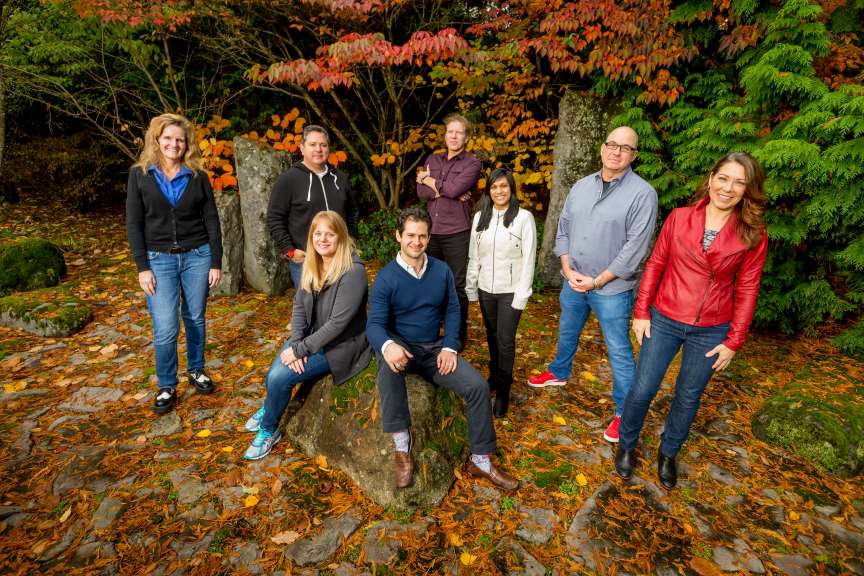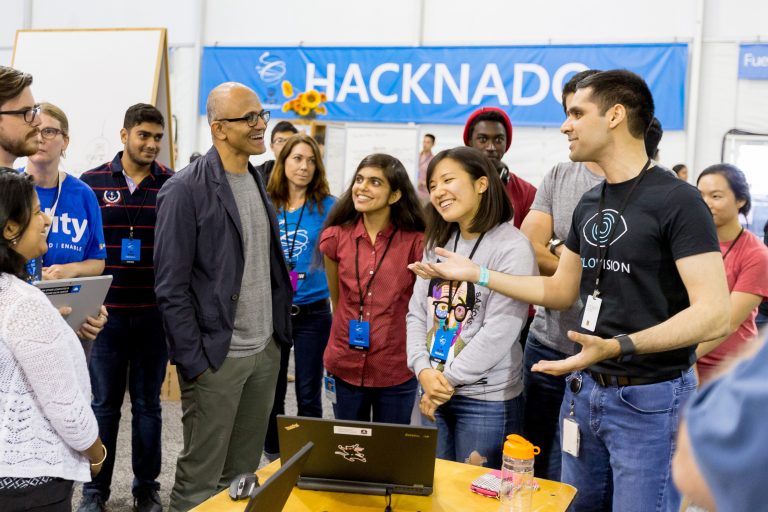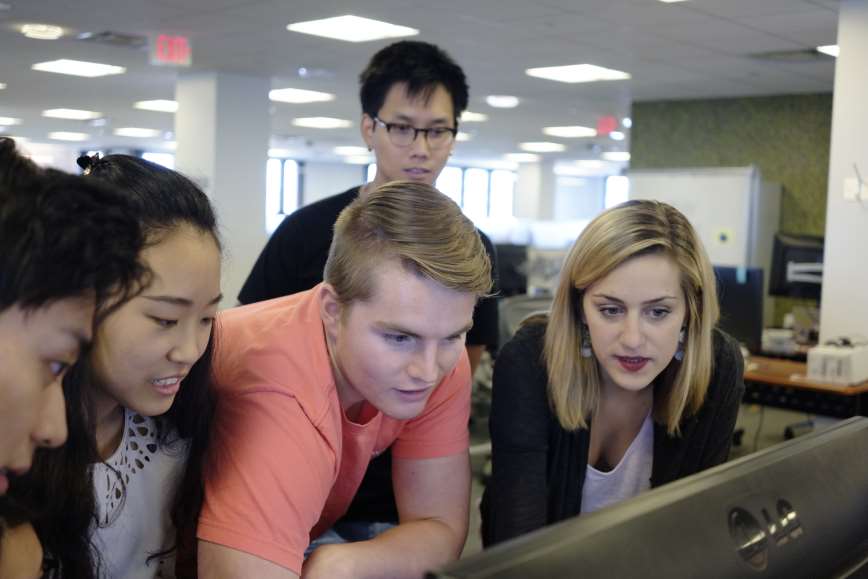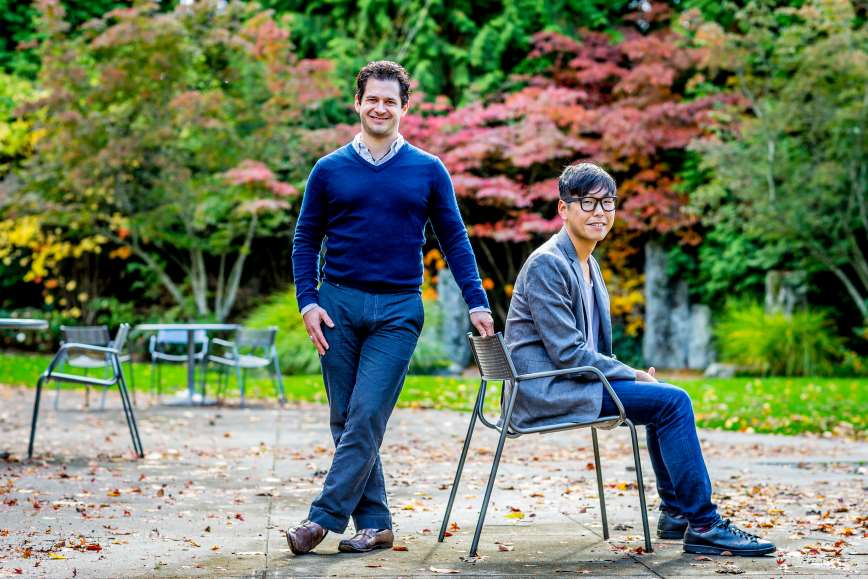
Step 1: Turn your passion into a project
A mantra resonates throughout The Garage: Doers, not talkers.
In the last two years, The Garage has evolved from a 24-hour idea factory to a program dedicated to encouraging all employees to take their ideas and bring them to life. The Garage provides resources such as expert advisors, maker spaces, hackathon tools, workshops, an intern program, and product-market fit testing to empower employees to follow their passion and create a project that might just make it all the way into a Microsoft product.
“The Garage is very focused on the bleeding edge of experimentation, moving forward at all times. We help Microsoft be better at experimenting, to be faster, to test ideas and to learn by doing,” says Jeff Ramos, partner director of The Garage. “We’ve really taken Satya Nadella’s challenge to be more customer obsessed seriously, putting projects in the hands of real customers.”
A recent example of this is Video Breakdown, a new platform released in September where you can search for videos about a specific topic, jump to the moments that mention it and share those segments.
“This is for me, one of the best examples of how a company can innovate without the fear of failing. We got the ability to ship this as an official Microsoft solution, as an experimental project,” says Ohad Jassin, head of the team that created Video Breakdown. “We’re innovating a lot of experiences here. We recreated the search experience, video editing, video playing and how they’re shared. There’s nothing to compare it to. So there’s a lot of learning we have to do along the way. We wanted to go publicly and get feedback. Those abilities of video indexing are highly relevant, but we want to make sure it’s battle proven. The Garage allows us to safely experiment with that approach and technology, on a real scale, in a meaningful manner.”

Step 2: Experiment, en masse
The annual company-wide summertime Hackathon produced by The Garage is one of its most visible events. Thousands of employees all over the world converge for a few days in July to hunker down as teams on a vast array of projects, including winners such as InstaFact, the OneNote for Learning extension and Ability Eye Gaze.
“Through the annual Hackathon, many projects get exposure and encouragement to keep going, and some make their way to the experimental outlet,” says Shahar Ronen, a senior program manager specializing in Query Intelligence.
For others, the Hackathon provided an opportunity to reach a greater audience — and realize a project’s potential using The Garage’s resources.
One quarter of the projects that release for customer feedback began with the Hackathon, the largest private hackathon on the planet with more than 16,000 participating in 2016.
“Every year our Hackathon gives us great insights on what’s hot with engineers,” Ramos says. “We saw IoT happening in 2014. We saw really, really interesting cloud projects in 2014 and 2015. In 2016, we saw the emergence of bots and AI. When we see these things, we try to react quickly and seize the moment.”
The Hackathon also syncs with a major tenet of The Garage: Transparency and outreach.
“We never want to release an experiment without working closely with the logical partners in the company,” Ramos says.

Step 3: Get your project into the hands of customers
It is also the two-year anniversary of becoming the official outlet for experimental projects from teams across the company, supporting the release of 75 projects direct to customers with many more in the pipeline. While some of the results may seem almost magical, The Garage in fact follows the scientific method. Hypotheses are proven or disproven. And either way, it’s a win.
As Ed Essey, the principal program manager for The Garage’s experimental outlet program, sees it, The Garage provides “an internal accelerator within the company, encouraging entrepreneurs within enterprise,” he says. “But we will never take any shortcuts around security or privacy with any of our products.”
George Matthews and the rest of the team behind Work Item Studio wanted to reach anyone who works with Visual Studio Online — developers, testers and program managers. So they released their app through The Garage in June 2015.
“The concept was using a mobile app to get notifications on Visual Studio services,” Matthews says. “We didn’t know how people were going to respond to this. Would they want to learn?”
Matthews, a senior program manager on The Garage team who handles product strategy for the intern program, learned a lot from that early experience. For him, the experimental outlet provides a “perfect channel” to “test the team’s hypothesis, get customer feedback and make rapid improvements,” he says. “If you are serious about getting hypothetical data, the experiment has to have a time constraint. A lot of products and experiments we ship are time-relevant, focused on popular trends in the market.”
In the 16 weeks they’re at Microsoft, the Garage interns — who Matthews describes as “top university engineering talent” — plunge in headfirst as a team to work on projects sponsored and pitched by sponsors in various Microsoft’s teams, who have a vested interest in the data gathered through these intern-built experiments.
Their experience is just one of many examples of how The Garage is a place for risk-takers within the company to try new things without the fear of failure, as they take away valuable understanding and information from every opportunity. And whatever they learn, they share so others can benefit from their experience.

Step 4. Make observations, collect data
Hub Keyboard began as a side project for Steve Won, a senior designer with Microsoft’s Office team.
“On the phone, a lot of people jump around different apps. It was a problem I was struggling with,” says Won. “Then I thought about focusing on the keyboard, which is already part of the ecosystem. What about creating a multi-window surface on the phone?”
A team made up of employees from all over the company came together to work on the app during the 2015 Hackathon.
“All of us believed in idea,” Won says. “Our main hypothesis was, if we expand the keyboard beyond a simple alpha numeric input, would people find it beneficial?”
Reviews from several publications and direct feedback from customers proved the expanded keyboard idea was useful. From this Android keyboard, users could pull names and other information from their contacts, share OneDrive or SharePoint documents and more. And if imitation is the greatest form of flattery, their idea seemed to rub off on Android’s makers: Two months later, Google came out with a similar keyboard on iOS.
“It helped me feel like we validated a user need so much that another big company did it,” Won says. “I feel proud that we got there before them. To me, getting this to be popular would be nice, but seeing something useful come back to the company was the higher priority. It helped drive the project in the right direction.”
After the team shipped Hub Keyboard, they listened to users and added more features. They learned what people liked and used. They added a thesaurus, Bing search and a way to share web links. Other Microsoft teams became interested in what they were learning, and it prompted others to hack on ideas and experiment, to learn and share, as they did.
“We were more focused on sharing what we learned,” Won says. “Other teams are better equipped to build on such a product.”
But the experience did inspire him to volunteer to be on the project advisory team to lend his expertise as a design advisor. He’s now working on a second experimental project, trying to give back to the program, and is in the process of getting it out the door.
“The second time, everything seems a lot easier,” Won says.
Won’s experience speaks to a core grounding within The Garage, Ramos says: To be able to work with a diverse set of people and teams all across Microsoft and all over the world.
“We work with people who are working on side projects, as well as formal product groups and engineering teams,” he says. “We all work for different parts of Microsoft, but we come together in our spare time to work on a personal passion, what we call grass-roots projects. The experimental outlet allows us to work more with formal engineering teams.”
Step 5: Reach a conclusion
When The Garage became the official outlet for experimental projects, Essey says, the team started with a big emphasis on “snacky apps” – small scale phone apps. But that quickly snowballed into Office add-ins, browser extensions, tests with hardware and web apps. Then more and more organizations within Microsoft wanted a place for massive experimentation.
“It seems like it’s the right time for The Garage scale up to meet this demand.” Essey says. “Our model is working. One of our earliest projects, Next Lock Screen, worked so well, it became No. 1 in its category in the Google Play Store.”
Microsoft software developer Steve Macbeth has worked closely with The Garage for more than two years as a member of the Loop team that created Next Lock Screen and Arrow Launcher.
“At first we were reluctant, as we wanted to go fast and innovate in the mobile space without bureaucracy. We assumed The Garage was just going to be another set of unnecessary hurdles,” Macbeth says. “However, we were pleasantly surprised and now count The Garage as one of our most important allies and partners. Over the last two years we have shipped four applications and are now in the process of shipping an early-release developer platform. Without the support of The Garage, this would not have been possible.”
The program helps answer questions for Microsoft teams seeking direct responses from customers on potential features. When they’ve achieved their objective, those projects are considered “Experiment Complete.” As project teams assess their results, they figure out how to move forward. Real data from customer interaction with the project yields actionable results. For some, the experiment never found its niche. For other teams, the experiment was crafted to inform a product in development. For example, Microsoft Research used My Moustache and Fetch to test the Face API for Microsoft Cognitive Services.
Eighteen experiments are moving to completed status today, in addition to the 12 that have already gained that status, for a total of 30.
“We set it up so it’s anti-fragile,” says Essey. “We set out to create a place where we can take risks and try wild new things. In the Garage, we don’t fail. We learn.”
Two years later, The Garage has earned respect and widespread involvement with its emphasis on hacking, making and experimenting. Through continually refining processes and creating more connections between these programs and engineering teams, The Garage is poised to guide even more projects from idea to customer feedback to experiment complete. But it’s really a reflection of how deeply employees have absorbed the cultural evolution of the company.
“I’m most proud of the impact of The Garage on our own employees and culture; we’ve been able to move away from permission-based culture to more empowering,” Ramos says. “Garage promotes the notion of wearing many hats and is teaching us as a mature company how to think like a startup. We want to be able to react to opportunities quickly. We’re about doing, not talking. We really pride ourselves on being able to react to leading indicators in the industry.”
